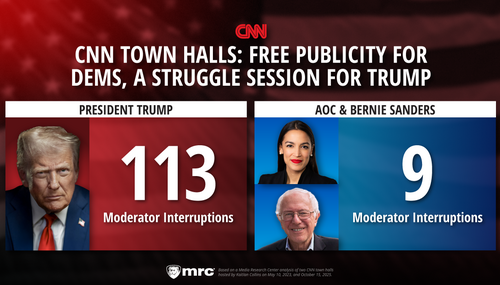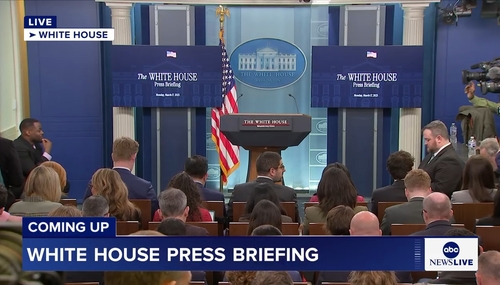On Wednesday's All In show, MSNBC host Chris Hayes again claimed that House Republicans are waging a "jihad" in trying to cut the food stamp program, asserting that "the GOP's jihad on those in need gets uglier every single day."
The MSNBC also fretted again over the possibility that violent felons may lose benefits while MSNBC contributor Joy Reid tried to link racism against minorities to the battle over food stamps. Reid:
And remember, too, there's also an ethnic, sort of, tinge to it, too. They're trying to imply that all of these people are black and brown people when in fact, white women with kids are probably more prototypical of people who are being helped by this program than anyone else.
Hayes included a plug for the segments on food stamps during the show's opening teaser: "Plus, yes, right wingers, people are going hungry in America. And the GOP's jihad on those in need gets uglier every single day."
At about 8:38 p.m., he again used the word "jihad" as he plugged: "There's a Republican jihad on food stamps, of all things, and it affects millions of people."
A bit later, he introduced one of the segments:
Last night on All In, I called out Republicans in the House for wanting to cut $20 billion over 10 years from the federal food stamp program. And, if they get their way, about two million people, four percent of participants, will lose their food stamp eligibility. My commentary got a fair amount of response, including this tweet from my friend and conservative writer, Tim Carney: "Are you predicting that many Americans will now die of hunger? Suffer malnutrition?"
He then responded: "In all honesty, I think people have that reaction a lot, and not in a cynical way. I mean, this is the richest country in the world. And it's true, we don't have people literally dying of starvation, but that also seems a rather low bar for a country as great as this one."
Hayes then coined the term "hunger truthers" as he responded to those who argue that the hunger situation in the U.S. is not as bad as liberals claim:
There are still, though, hunger truthers out there like Texas Republican Steve Stockman who believe that if you can't survive off food stamps, then you're, quote, "intentionally buying overpriced food and shopping at high-priced chains." Most people don't realize that the average food stamp benefit amounts to $4.50 a day or $31.50 a week.
During the second of two segments on the subject, Hayes brought up an attempt by Louisiana Republican Senator David Vitter to bar violent felons from receiving food stamps and found the effort "strange." Hayes:
Those are obviously horrific crimes. Anyone who commits them should be held to account and face justice. When that justice has been served and they've gotten out of prison, it strikes me as strange that you would want to not have them eat.
A bit later, panel member and MSNBC contributor Joy Reid introduced race:
And remember, too, there's also an ethnic, sort of, tinge to it, too. They're trying to imply that all of these people are black and brown people when in fact, white women with kids are probably more prototypical of people who are being helped by this program than anyone else.
Below is a transcript of relevant portions of the Wednesday, June 19, All In with Chris Hayes on MSNBC:
CHRIS HAYES: Plus, yes, right wingers, people are going hungry in America. And the GOP's jihad on those in need gets uglier every single day.
(...)
HAYES, AT 8:38 P.M.: There's a Republican jihad on food stamps, of all things, and it affects millions of people.
(...)
HAYES: Last night on All In, I called out Republicans in the House for wanting to cut $20 billion over 10 years from the federal food stamp program. And, if they get their way, about two million people, four percent of participants, will lose their food stamp eligibility. My commentary got a fair amount of response, including this tweet from my friend and conservative writer, Tim Carney: "Are you predicting that many Americans will now die of hunger? Suffer malnutrition?"
In all honesty, I think people have that reaction a lot, and not in a cynical way. I mean, this is the richest country in the world. And it's true, we don't have people literally dying of starvation, but that also seems a rather low bar for a country as great as this one. The truth of the matter is that in 2011, 50 million people in America could not afford to provide adequate food for themselves or their families. And according to the USDA, of those, 17 million often had to skip meals, reduce the size of their meals, or even go without eating for an entire day.
UNIDENTIFIED FEMALE: The assistance programs in the United States are very hard to qualify for. It's like either you're starving or you don't get any help. Well, what defines starving? If you don't eat for a day, are you starving? In their eyes, no, but in your eyes and the way you feel, of course.
HAYES: There are still, though, hunger truthers out there like Texas Republican Steve Stockman who believe that if you can't survive off food stamps, then you're, quote, "intentionally buying overpriced food and shopping at high-priced chains." Most people don't realize that the average food stamp benefit amounts to $4.50 a day or $31.50 a week.
So, this month, 26 members of Congress lived off a food stamp budget for a week to draw attention to House Republicans' cuts to the program. And they quickly discovered something about hunger that poor people have known for a while. It sucks. So enter Congressman Stockton's Communications Director, Donny Ferguson. His Twitter bio says his mind is so powerful he wears an 11-gallon hat. He did about 12 gallons of trolling saying he took the food stamp challenge and quote, "Based on my personal experience with SNAP benefit limits we have room to cut about 12 percent more." See, $4.50 a day was more than enough for him to eat. He had a full belly with a few bucks to spare.
Now, let's keep in mind here just who is actually eligible and benefiting from SNAP. Food stamp eligibility is based on total gross household income. And to qualify a family of four cannot exceed $29,976 a year, which equals $2,498 a month. Subtract $949 for a typical two-bedroom apartment, subtract another $1,066 in child care costs if you have one four-year-old and one school-age child. And you're left with $483 for everything for the month, car insurance, gas, electric and phone bills, heat, clothes, incidentals and groceries. I'd like to see Mr. Ferguson manage that challenge for a whole year and then tell me how well he ate.
(...)
HAYES: I want to play this soundbite because we focus on the House, but there's a Senate bill that's way less draconian. It's about $4 billion in cuts over a ten-year period, but David Vitter did manage to get this amendment in. And I want to play sound of him explaining what it is.
SENATOR DAVID VITTER (R-LA): My second amendment is very simple and straightforward. It would establish a complete ban in the program for anyone who's committed a violent rape, a crime of pedophilia, or a murder. And there would be no opt out for states. I hope, Mr. President, we can form a bipartisan consensus around this basic idea.
HAYES: Those are obviously horrific crimes. Anyone who commits them should be held to account and face justice. When that justice has been served and they've gotten out of prison, it strikes me as strange that you would want to not have them eat.
LORI SILVERBUSH, CO-DIRECTOR OF A PLACE AT THE TABLE: Do you want, once justice has been served, to have their children not to eat?
HAYES: Right, that's a really good point. Right, there's this cascade effect on households really.
SILVERBUSH: I mean, really, I think most Americans are smarter than that. That's obvious of naked politicking. Here we are, trying to equate food stamps and criminality. It's no more complicated than that.
HAYES: And that has been a running theme of the Republican assault. I mean, when you look at the amendment list when we were going through them, it's drug tests for them, it's this idea that there are people lining up, the takers who are trying to sort of bilk this program for all it's worth, we need to put these checks in front of them to make sure they`re not gonna-
REID: And remember, too, there's also an ethnic, sort of, tinge to it, too. They're trying to imply that all of these people are black and brown people when in fact, white women with kids are probably more prototypical of people who are being helped by this program than anyone else.




